There are so many things to be thankful for at Thanksgiving. This turkey is near the top of the list.
Thanksgiving is truly one of the most special times of the year. Loved ones gather to laugh, rejoice, reflect, and most importantly, eat delicious food. The centerpiece of the Thanksgiving table is often a beautiful turkey. We love roasted turkey, spatchcock turkey, and roast turkey breast with herbs, with all the fixings. But this particular turkey is truly something to behold. And feel truly thankful. It’s just that good.
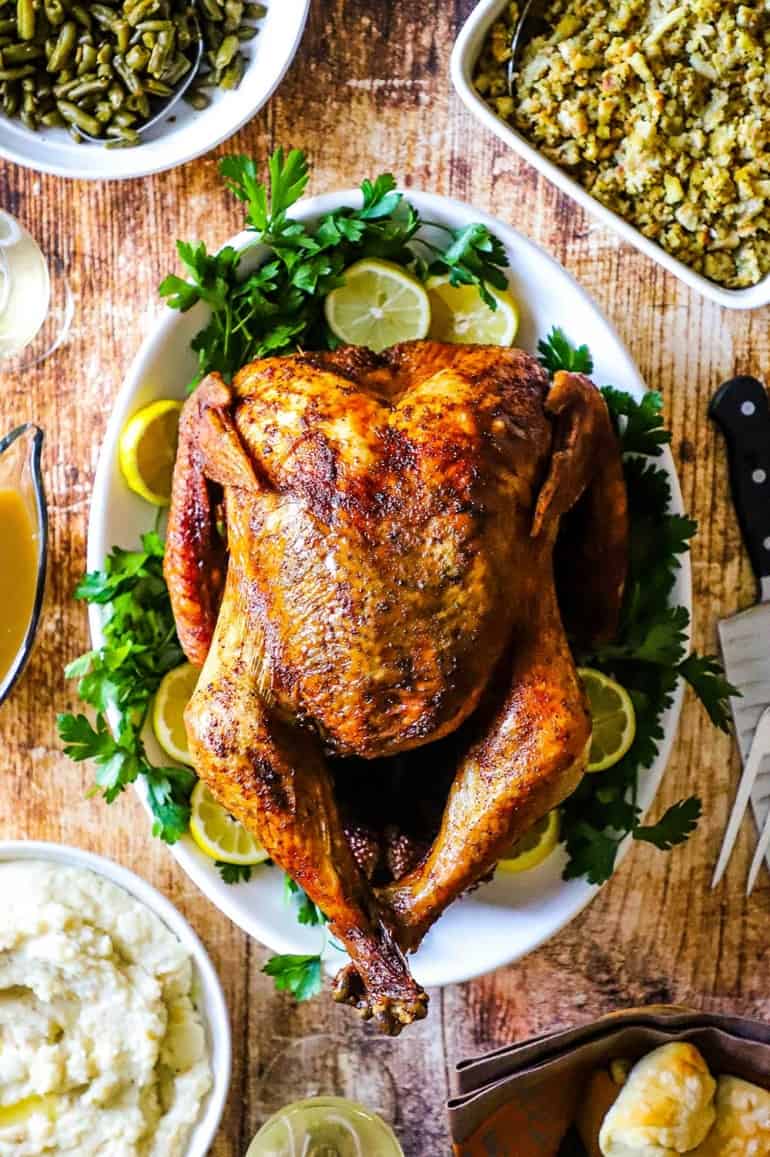
How To Make a Deep-Fried Turkey
Frying a turkey for the holidays is not terribly difficult, but there are some very important precautions and steps that you will need to follow to ensure the bird is cooked safely and deliciously.
We use an indoor deep-fryer from Masterbuilt. It is amazing and very safe. We also use an oversized meat syringe to inject the buttery marinade.
By the way, deep-fried turkey has its roots down in Louisiana Bayou Country and East Texas. Learn much more about this fairly new culinary turkey craze here.
NOTE: If you liked this video, please subscribe to our YouTube channel. Remember to click the little ‘bell’ icon so you’ll never miss a new video! Thank you!
The Ingredients You Will Need
Besides the turkey, you’ll need a handful of ingredients for an amazing rub and then also a marinade that will be injected into the bird. Yes, injected.
Let’s start with the turkey.
We recommend a 14 to 17-lb turkey. Frozen is perfectly fine. But, it’s super important that the bird is 100% thawed before lowering it into the hot oil. Ice particles will release steam and create dangerous hot oil splatters that can cause injury.
No need to brine the turkey. We’re going to inject juiciness and flavor into our bird!
For the rub, here’s what you’ll need
Kosher salt and black pepper
Garlic powder
Onion powder
Smoked paprika
Creole seasoning (or Cajon, or just cayenne pepper)
Ground thyme
For the marinade injection, here’s what you’ll need
Unsalted butter
Canola oil
Chicken stock (or turkey stock)
Lemon juice, freshly squeezed
Onion powder
Garlic powder
Hot sauce, such as Louisiana, Tobasco, or Franks
Creole seasoning (or Cajun, or just cayenne pepper)
Kosher salt
For the oil, we highly recommend peanut oil. It can handle high temperatures for a sustained period of time. Vegetable oil or canola oil will work in a pinch.
EXPERT TIP: When injecting the marinade into the bird, you’ll want to create as few holes as possible. Insert the syringe once, inject the marinade, and then remove it. Place it again in the same hole but in another direction. Continue several times per breast and a couple of times in the legs and thighs.
Tips for Perfect Deep-Fried Turkey
Air-Chill – Start early. You’ll need to give yourself a few days to allow the bird to defrost (if frozen) in the refrigerator. See NOTES on how to thaw the bird faster. Make the rub and apply it all over the turkey. Inject the marinade as instructed. Then, place on a baking rack on a baking pan and place in the fridge for at least 4 hours if possible, even better is overnight! This helps the skin get slightly crispy during the frying process.
Use an Instant-Read Thermometer – We recommend frying the turkey at 335°F to get that perfectly golden skin. This typically will mean about 3.5 minutes per pound of frying. However, that can vary somewhat. The best way to ensure you have a perfectly cooked turkey is to insert an instant-read thermometer or digital meat thermometer in the thickest part of the breast. Once you reach between 160°F and 170°F, the turkey is ready.
Serve Warm – We all love leftover turkey, even if it’s cold, right from the fridge. For this turkey, sometimes the butter marinade will congeal somewhat within the turkey meat after it completely cools. This is no problem, but it can be a little off-putting if guests aren’t sure what it is. When served nice and warm, the marinade is juicy and compliments the texture and flavor of the meat perfectly.
EXPERT TIP: Lower the turkey very slowly into the hot oil. A step stool helps you easily guide the basket holding the bird into the hot oil.
How to Serve
As mentioned, this turkey is best served hot, while the injected marinade is still completely melted and very juicy.
You can place the bird on a platter and bring to the table, or, you can cut away the breast meat and slice, and then cut up the dark meat and present it on a serving dish. Learn how to carve a turkey here.
EXPERT TIP: Allow the fried turkey to sit in the basket for about 10 minutes before handling. Heat-resistant gloves will allow you to carefully lift the bird and tip it sideways to drain in oil that is still in the cavity.
Classic Thanksgiving Side Dishes
There is no doubt that this Deep-Fried Turkey is the star of the show, but these classic side dishes will help you round out the perfect Turkey Day feast:
Gourmet Green Bean Casserole
Perfect Mashed Potatoes
Candied Yams
Maple Orange Cranberry Sauce
Creamed Corn Casserole
Maple Braised Carrots
Ultimate Mac ‘n Cheese
Strawberry Pretzel Salad
Homemade Dinner Rolls
These are all wonderful sides to this spectacular superstar main dish!
What To Do With Leftovers
A 14 to 17-lb turkey will comfortably feed 8 to 12 people. In the unlikely event that there are leftovers, you have options on how to utilize them.
First of all, offer your guests to take any leftovers home. We always have to-go containers which make it easy for folks.
If you still have leftovers, there’s nothing much better than a turkey sandwich with a little smear of mayonnaise, lettuce, and tomato. Additionally, here are some of our favorite ways to utilize leftover turkey:
Day After Thanksgiving Panini
Turkey Tettrazzini
Turkey and Stuffing Casserole
EXPERT TIP: Be sure to keep the turkey carcass and make homemade stock! (Substitute the turkey bones for the chicken bones).
We have prepared turkey for many, many years, for many, many Thanksgiving feasts.
It is safe for us to say that this is probably the most delicious turkey we have ever made and served.
It’s a bit of an investment for the inside deep-fryer and even the peanut oil. But it is an investment that you will enjoy the returns for years to come. It’s truly that spectacular.
Ready to take your Thanksgiving feast to the next level? Go for it!
And when you do, be sure to take a photo of it, post it to Instagram, and tag @HowToFeedaLoon and hashtag #HowToFeedaLoon!

Best Deep-Fried Turkey
Video
Equipment
- Extra Large Deep-Fryer See the blog post for the link
- Large meat injector See the blog post for the link
Ingredients
- 1 16 lb turkey fully thawed
- 2.75 lbs peanut oil
For the Rub
- 2 tablespoon garlic powder
- 1 tablespoon smoked paprika
- 2 tablespoon Kosher salt
- 1 teaspoon black pepper
- 2 tablespoon Creole seasoning or Cajun, or cayenne pepper
- 1 teaspoon sage ground, or ground thyme
- 1 tablespoon onion powder
For the Marinade Injection
- ⅓ cup butter melted
- ¼ cup canola oil
- ½ cup chicken stock or turkey stock
- 1 large lemon juice squeezed
- 2 teaspoon onion powder
- 2 teaspoon garlic powder
- 2 teaspoon hot sauce such as Louisiana, Tabasco, or Franks
- 2 teaspoon Creole seasoning or Cajun, or cayenne pepper
- 1 teaspoon Kosher salt not coarse, or just table salt
Instructions
- Preheat the oil to 335°F. This usually takes anywhere from 30 to 45 minutes.2.75 lbs peanut oil
- In a small bowl, mix together the rub ingredients.2 tablespoon garlic powder, 1 tablespoon smoked paprika, 2 tablespoon Kosher salt, 1 teaspoon black pepper, 2 tablespoon Creole seasoning, 1 teaspoon sage, 1 tablespoon onion powder
- Pat the turkey dry with paper towels. Use your hands to apply the rub all over the turkey, including some in the cavity. Make sure to have removed the neck and the giblets.⅓ cup butter, ¼ cup canola oil, ½ cup chicken stock, 1 large lemon, 2 teaspoon onion powder, 2 teaspoon garlic powder, 2 teaspoon hot sauce, 2 teaspoon Creole seasoning, 1 teaspoon Kosher salt
- In a medium-sized bowl, stir together the marinade mixture. Fill the syringe with marinade. Inject the marinade into one of the breasts. Remove the syringe and insert it again in the same hole, but direct the needle in a different direction. Repeat this several times. Do this again with the other breast, and then the legs and thighs. You'll want to inject about a third of a cup in each breast, and about a quarter cup in the legs and thighs.1 16 lb turkey
- Carefully place the bird in the basket and use the handle extension to slowly lower the basket into the hot oil.
- Lower the lid and fry the turkey for 3.5 minutes per pound until the internal temperature of the thickest part of the thigh reaches 165°F.
- Very carefully raise the basket from the oil (using the handle extension) and place it on the hook on the side of the fryer (see video for reference). Let the turkey rest for at least 15 minutes, tilting the bird to allow any accumulated oil in the cavity to drain out.
- Carve and serve warm.

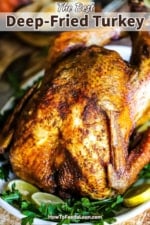

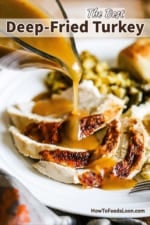
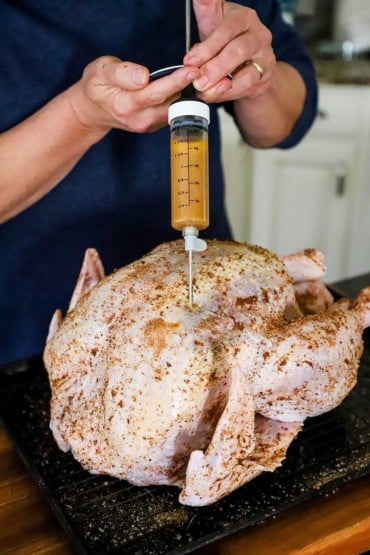
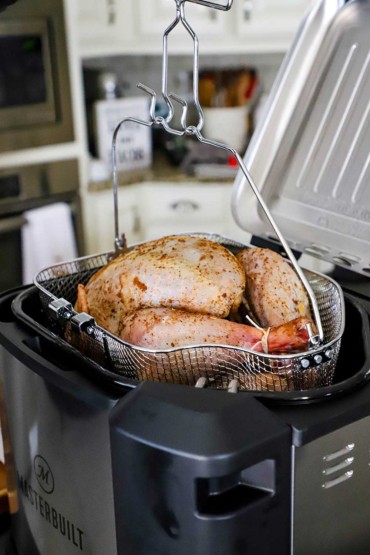
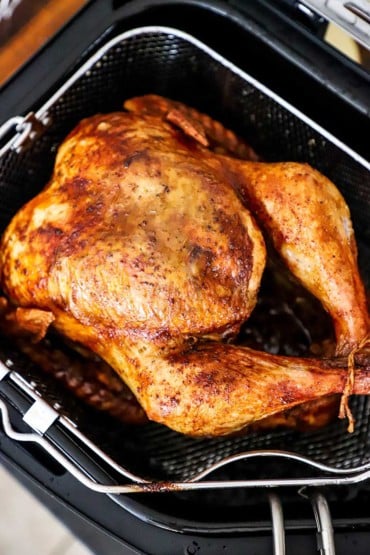
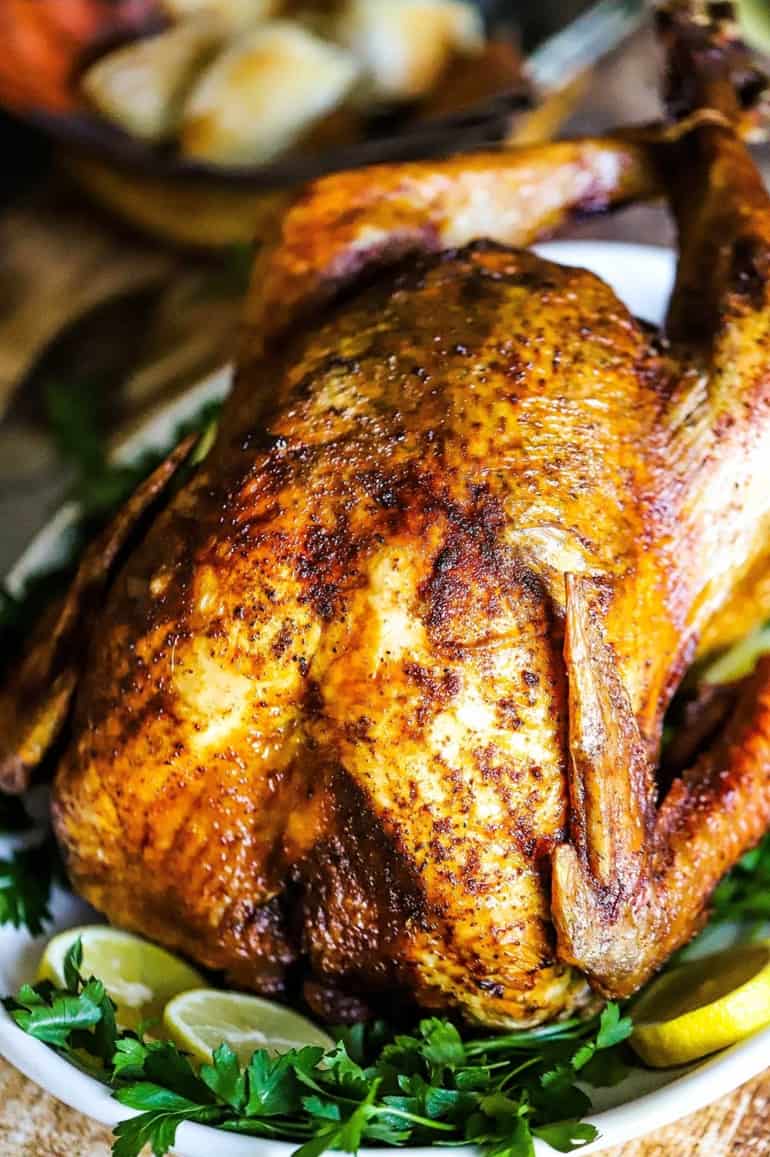
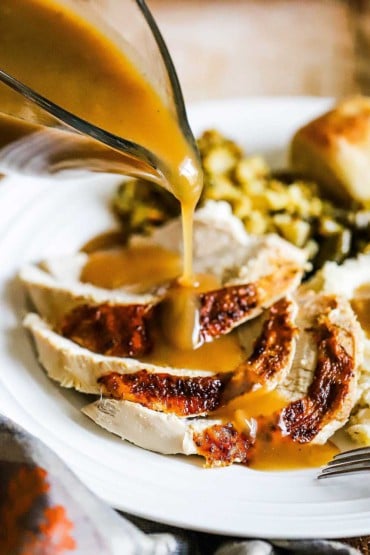
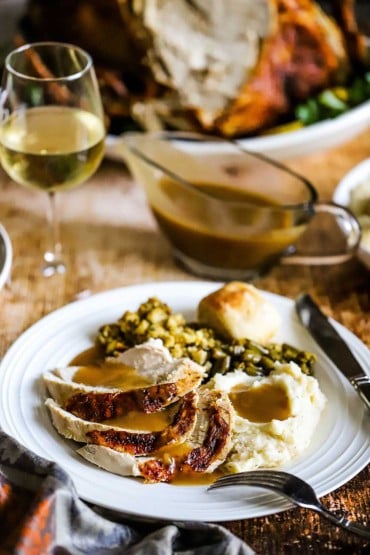
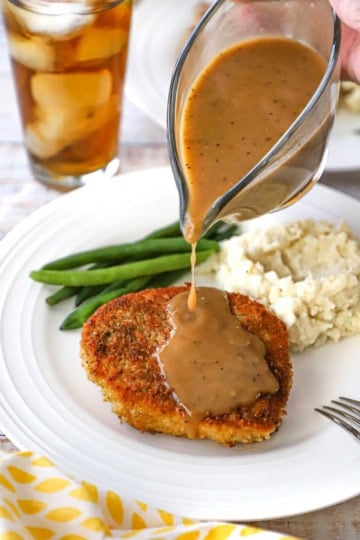

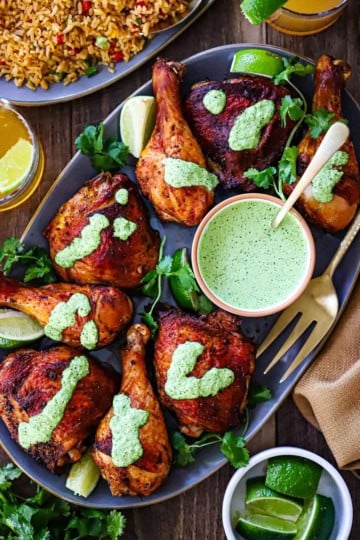

Leave a Reply